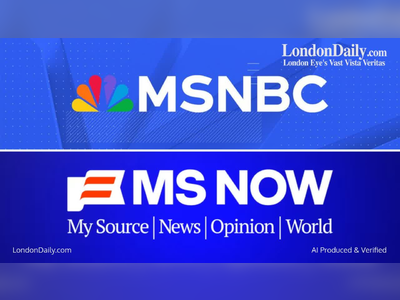Will this be the first country to return to negative interest rates?
Switzerland faces economic strain from a surging franc, U.S. tariffs, and weak growth, with analysts warning of possible recession and the central bank under pressure to cut rates below zero.
This week’s economic data from Switzerland offered little encouragement.
Growth in the last quarter was only 0.1%, far below the previous quarter; the Swiss franc has strengthened to the point of hurting exports; and U.S. tariffs of 39%—the highest imposed on any developed nation—are weighing heavily on trade.
The tariffs were enacted by President Donald Trump after a contentious call with Switzerland’s president last month.
The Swiss government has tried to ease the blow, with ministers traveling to Washington earlier this month offering large energy purchases and investments in the United States.
Even the idea of using FIFA president Gianni Infantino, a Swiss national and long-time associate of Trump, for lobbying was considered.
So far, these efforts have not altered U.S. policy.
Sectors ranging from chocolate and watches to technology, industry, and pharmaceuticals now face the risk of a serious downturn.
The pressure on the Swiss National Bank is increasing.
In June, it became the first central bank in the West to return to a zero interest rate, partly to dampen the franc’s appeal as investors fled from the dollar into alternative currencies, as well as gold and silver.
The franc has risen 13% against the dollar since the start of the year.
Inflation fell to just 0.2% in July, far below the 2% target common among central banks.
Amid these developments, there are growing calls and analyst forecasts that Switzerland may be the first Western country to return to negative interest rates to support economic activity and weaken the currency.
Goldman Sachs estimated this week that at its September meeting the Swiss National Bank could cut the policy rate to minus 0.25%.
Such a step may be viewed in Washington as currency manipulation, potentially worsening tensions with the U.S., Switzerland’s second-largest trading partner after the European Union.
The outlook contrasts sharply with Switzerland’s reputation for stability, competitiveness, and business strength.
In the first quarter of the year, GDP rose 0.5%, largely due to rapid pharmaceutical exports to the U.S. in anticipation of tariffs.
In the past three months, however, growth has nearly stalled.
Analysts from Pantheon Macroeconomics warned that the second half of 2025 “will be ugly” and that Switzerland risks sliding into recession.
For decades, Switzerland’s neutrality and non-membership in both the EU and NATO allowed it to trade freely worldwide without compromise.
Now, with tariffs applying to an estimated 40% of its exports to the U.S., economists calculate that if tariffs remain unchanged, Swiss GDP could shrink by 0.7% this year and another 0.3% next year.
Finance Minister Karin Keller-Sutter has even suggested that factories may need to move to shift work to avoid layoffs while reducing costs.
Some in Switzerland note that if the country were an EU member, tariffs would only be 15%.
“The difference is the price Switzerland pays for standing alone against the U.S.,” said one economist this week.
The government’s current priority is to reduce the tariffs, though others argue Switzerland should retaliate.
Proposals include new investment agreements, additional military procurement, agricultural market openings, and energy purchases to incentivize the U.S.
Other voices suggest leveraging Switzerland’s role as a transit hub for global gold.
Swatch CEO Nick Hayek proposed a reciprocal 39% tariff on gold shipments to the U.S., warning that since two-thirds of global gold trade passes through Switzerland, such a measure could threaten Washington.
At the same time, calls are rising to strengthen ties with the EU, though that would also carry economic consequences.
Switzerland’s neutral stance has allowed it to keep defense spending at just 0.7% of GDP, compared to NATO’s average of about 3% and a 2035 target of 5%.
However, reliance on NATO for security while avoiding costs has drawn criticism.
As Europe faces new pressures, demands on Switzerland may increase.
The economic turbulence now confronting the country is challenging long-standing assumptions about neutrality, European integration, and global independence.
For the moment, these concerns have not been fully reflected in markets.
The Swiss stock index rose 1% last week, and the franc slipped only slightly against the dollar.
Large Swiss corporations, from watchmakers to investment firms, continue lobbying in Washington, while all eyes remain on the next growth data and the evolving relationship with the U.S.
Growth in the last quarter was only 0.1%, far below the previous quarter; the Swiss franc has strengthened to the point of hurting exports; and U.S. tariffs of 39%—the highest imposed on any developed nation—are weighing heavily on trade.
The tariffs were enacted by President Donald Trump after a contentious call with Switzerland’s president last month.
The Swiss government has tried to ease the blow, with ministers traveling to Washington earlier this month offering large energy purchases and investments in the United States.
Even the idea of using FIFA president Gianni Infantino, a Swiss national and long-time associate of Trump, for lobbying was considered.
So far, these efforts have not altered U.S. policy.
Sectors ranging from chocolate and watches to technology, industry, and pharmaceuticals now face the risk of a serious downturn.
The pressure on the Swiss National Bank is increasing.
In June, it became the first central bank in the West to return to a zero interest rate, partly to dampen the franc’s appeal as investors fled from the dollar into alternative currencies, as well as gold and silver.
The franc has risen 13% against the dollar since the start of the year.
Inflation fell to just 0.2% in July, far below the 2% target common among central banks.
Amid these developments, there are growing calls and analyst forecasts that Switzerland may be the first Western country to return to negative interest rates to support economic activity and weaken the currency.
Goldman Sachs estimated this week that at its September meeting the Swiss National Bank could cut the policy rate to minus 0.25%.
Such a step may be viewed in Washington as currency manipulation, potentially worsening tensions with the U.S., Switzerland’s second-largest trading partner after the European Union.
The outlook contrasts sharply with Switzerland’s reputation for stability, competitiveness, and business strength.
In the first quarter of the year, GDP rose 0.5%, largely due to rapid pharmaceutical exports to the U.S. in anticipation of tariffs.
In the past three months, however, growth has nearly stalled.
Analysts from Pantheon Macroeconomics warned that the second half of 2025 “will be ugly” and that Switzerland risks sliding into recession.
For decades, Switzerland’s neutrality and non-membership in both the EU and NATO allowed it to trade freely worldwide without compromise.
Now, with tariffs applying to an estimated 40% of its exports to the U.S., economists calculate that if tariffs remain unchanged, Swiss GDP could shrink by 0.7% this year and another 0.3% next year.
Finance Minister Karin Keller-Sutter has even suggested that factories may need to move to shift work to avoid layoffs while reducing costs.
Some in Switzerland note that if the country were an EU member, tariffs would only be 15%.
“The difference is the price Switzerland pays for standing alone against the U.S.,” said one economist this week.
The government’s current priority is to reduce the tariffs, though others argue Switzerland should retaliate.
Proposals include new investment agreements, additional military procurement, agricultural market openings, and energy purchases to incentivize the U.S.
Other voices suggest leveraging Switzerland’s role as a transit hub for global gold.
Swatch CEO Nick Hayek proposed a reciprocal 39% tariff on gold shipments to the U.S., warning that since two-thirds of global gold trade passes through Switzerland, such a measure could threaten Washington.
At the same time, calls are rising to strengthen ties with the EU, though that would also carry economic consequences.
Switzerland’s neutral stance has allowed it to keep defense spending at just 0.7% of GDP, compared to NATO’s average of about 3% and a 2035 target of 5%.
However, reliance on NATO for security while avoiding costs has drawn criticism.
As Europe faces new pressures, demands on Switzerland may increase.
The economic turbulence now confronting the country is challenging long-standing assumptions about neutrality, European integration, and global independence.
For the moment, these concerns have not been fully reflected in markets.
The Swiss stock index rose 1% last week, and the franc slipped only slightly against the dollar.
Large Swiss corporations, from watchmakers to investment firms, continue lobbying in Washington, while all eyes remain on the next growth data and the evolving relationship with the U.S.










